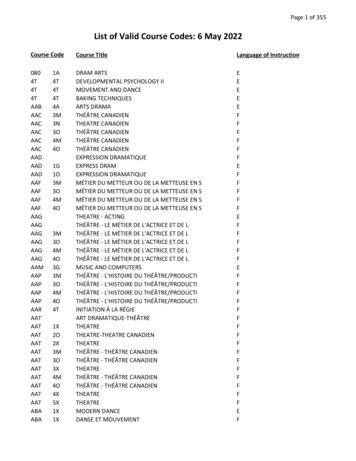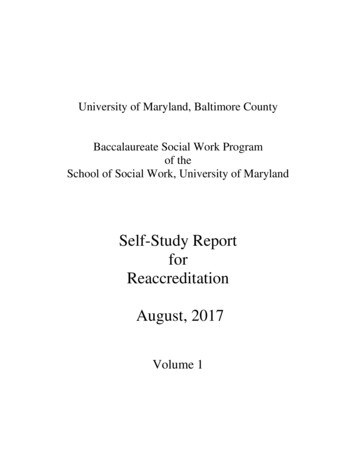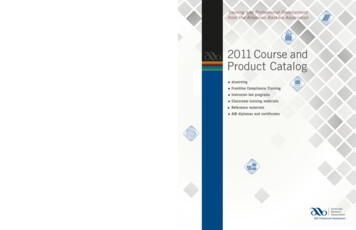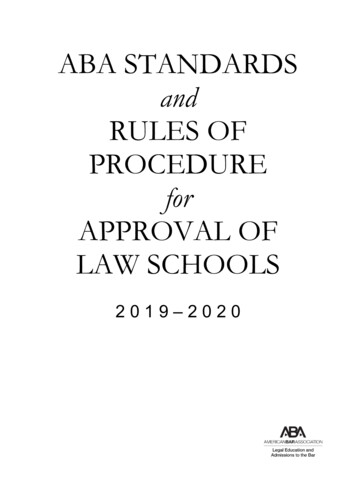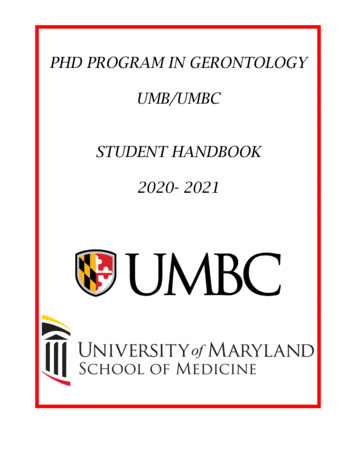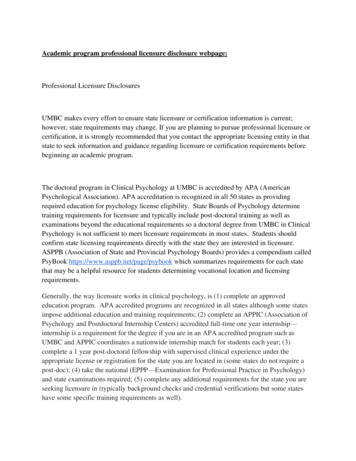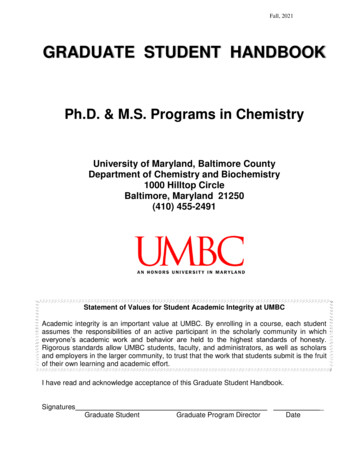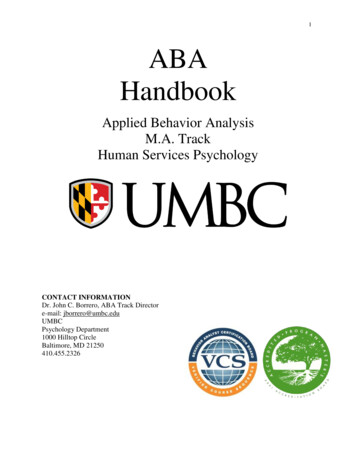
Transcription
1ABAHandbookApplied Behavior AnalysisM.A. TrackHuman Services PsychologyCONTACT INFORMATIONDr. John C. Borrero, ABA Track Directore-mail: jborrero@umbc.eduUMBCPsychology Department1000 Hilltop CircleBaltimore, MD 21250410.455.2326
2This document is intended to help students understand aspects of the ABA Track, to provideexamples of course sequences, and to highlight (through consideration of the Practicum andIntervention course syllabi) aspects of the experience that will be evaluated in determination ofthe student's grade in these courses and on the final capstone project.If a student has any questions based on information presented, or not presented, in this handbook,the student should contact the Director of the ABA Master's Track for clarification, Dr. J. C.Borrero.
3Applied Behavior AnalysisMaster of Arts Track: A degree in the Human Services Psychology programProgram DescriptionBehavior analysis is the science of the causes of behavior. In applied behavior analysis, thisscience is applied to significant problems of human behavior, typically at the level of theindividual rather than of the group. The scope of applied behavior analysis is wide-ranging,including work in intellectual and developmental disabilities, in behavioral medicine, inorganizational settings, and in education, to mention just a few applications. Mastery of appliedbehavior analysis calls for competence in basic psychology, in the detailed knowledge base ofbehavior analysis, in measurement techniques for evaluating existing behavior and for designingassessment and treatment programs for individuals in organizations and in communities whileadhering to high standards of ethical and professional behavior, and in the various skills essentialto delivering services and maintaining their effectiveness.MissionThe mission of the M. A. track in Applied Behavior Analysis at UMBC is to prepare graduates toenter the workforce as well-trained clinicians who can work in a variety of applied contexts, byapplying the principles of behavior to socially significant behavioral problems. In addition, weseek to prepare graduates for doctoral training in behavior analysis, should they choose.Training, in coursework and in practice, is designed to promote a culture of inclusive excellence.ObjectivesThe objectives of the M. A. track in Applied Behavior Analysis at UMBC are to providecoursework in basic and applied behavior analysis with an emphasis on essential aspects ofApplied Behavior Analysis, and to provide practice experiences so that students may becomeproficient in the application of behavior principles. As part of the degree requirements, studentscomplete a capstone project that is designed and conducted in collaboration with a designatedcommittee chair and two other committee members. The student is expected to make a novelcontribution to the research literature, or to replicate or extend the research literature.Accreditation and CertificationApplied behavior analysis includes accountability in its service delivery. The UMBC M.A.Program is responsive to the increasing call for such services and fills a gap in the availability ofsuch programs in the mid-Atlantic region. The UMBC Department of Psychology and itspartners are ideally suited to developing and maintaining such a program. The program isaccredited by the Association for Behavior Analysis, International and is included in the list of
4programs approved by the Behavior Analysis Certification Board. The Behavior AnalystCertification Board , Inc. has verified the following courses toward the courseworkrequirements for eligibility to take the Board Certified Behavior Analyst . BACB Verified Course Sequence Association for Behavior Analysis, International Accredited Program
5Academic IntegrityAll students and faculty are expected to adhere to the following principles and guidelinesregarding Academic Integrity.Statement of Values for Student Academic Integrity at UMBCAcademic integrity is an important value at UMBC. By enrolling in a course, each studentassumes the responsibilities of an active participant in the scholarly community in whicheveryone’s academic work and behavior are held to the highest standards of honesty. Rigorousstandards allow UMBC students, faculty, and administrators, as well as scholars and employersin the larger community, to trust that the work that students submit is the fruit of their ownlearning and academic effort.The purposes of higher education are the learning students and faculty undertake, the knowledgeand thinking skills developed, and the enhancement of personal qualities that enable students tobe strong contributing members of society. In a competitive world, it is essential that allmembers of the UMBC community uphold a standard that places the integrity of each student’shonestly earned achievements above higher grades or easier work dishonestly sought.All members of the UMBC community are expected to make a commitment to academic honestyin their own actions and with others. Academic misconduct could result in disciplinary actionthat may include suspension or dismissal. Following are examples of academic misconduct thatare not tolerated at UMBC: Cheating: Knowingly using or attempting to use unauthorized material, information, or studyaids in any academic exercise.Fabrication: Intentional and unauthorized falsification or invention of any information orcitation in an academic exercise.Facilitating Academic Dishonesty: Intentionally or knowingly helping or attempting to helpanother commit an act of academic dishonesty.Plagiarism: Knowingly representing the words or ideas of another as one’s own in any academicexercise, including works of art and computer-generated information/images.Students should consult UMBC’s Student Academic Conduct Policy for information on policyand procedures for upholding UMBC’s high standards for academic integrity. Student who havequestions or concerns are encouraged to talk with a member of the faculty or administration forassistance.DiversityIt is an expectation that HSP students will demonstrate respect for human diversity in all itsmanifestations, including age, disability, ethnicity, gender, gender identity, language, nationalorigin, race, religion, culture, sexual orientation, and socioeconomic status.
6Professional Behavior and ExpectationsStudents are expected to handle all professional commitments in a responsible manner.Professional commitments include, but are not limited to:1. Fulfilling job responsibilities in a timely manner;2. Providing quality and timely clinical or community services, reports, and administrative3. documentation;4. Attending and actively participating in all classes—which includes arriving on time,being fully prepared for class, completing assignments on time, and refraining fromdistracting or interfering activities during class (e.g., texting, web surfing or other nonclass-related activities); and5. Checking UMBC email regularly and responding to communication about professionalresponsibilities promptly as appropriate to one’s duties/roles.Professional development will be evaluated as part of students’ annual evaluations or morefrequently if concerns are brought to the attention of the faculty.Stress ManagementGraduate education is inherently stressful. This tends to diminish as students move beyondtheir first year of training, but it is a fact of life that our best efforts cannot fullyeliminate. There are some things, however, that students can do that should help them incoping with this stress.1. Don’t try to face it alone. There is much evidence to suggest that peer support can help bufferthe effects of stress. Discovering that you are not alone in your experiences ofuncertainty, fear, anger, and so forth, by sharing these with your fellow students, can go along way toward mitigating their effects. Forming study groups, informal socializing, anddiscussing your concerns with your fellow students are important ways of gaining peersupport and developing a sense of community in the program. We recommend themhighly.2. Turn to the faculty. Remember that the faculty is highly invested in your succeeding in theprogram. You wouldn't be in the program if the faculty did not believe that you couldsucceed. Make an effort to become acquainted with the faculty. They can be an importantsource of support--both informational and personal--and want to be.3. Know what to expect, and plan for it. There are two peak periods of stress for students in theprogram. The first is your first year, when you feel overwhelmed by the demands of theprogram and by the changes that have occurred in your life in entering the program, andthe second is when you are preparing for and carrying out the capstone project. To feelanxious during these two periods is normal, although nonetheless uncomfortable. In thecase of first-year stress, it can help to get to know some second year students--theysurvived; find out how and recognize that they are not so different from you. Also, inspite of all the work you have, set aside some time for socializing and recreation; theseare essential to your health.4. Maintain some balance between your life as a student and the rest of your life. In particular, ifyou are married, have a family, or a significant other, make time for them. This is a
7period of strain for them, just as it is for you; they need your affection and attention totheir needs and concerns, just as you need theirs. Remember, your career is only one partof your life, and will mean little without the rest.5. Check out rumors. Rumors are inevitable and can at times be sources of stress. The best wayof dealing with them is by confronting them directly by discussing them with youradvisor, specialty program director, or the ABA track director, in order to learn the facts.The facts are usually less ominous than the rumors that were cast by their shadow.
8ABA Track RequirementsStudents complete course work in ethics, basic and applied analyses of behavior, research designand data evaluation, and practicum placement for hands-on experience with relevant behavioralprocedures. Matters related to the ethical practice of behavior analysis are also addressed acrossa number of courses. In place of a master's thesis, students complete a capstone project using theskills acquired in the track.The requirements total 36 credit hours consisting of the courses listed below. Consult the currentUMBC Graduate School catalog for detailed departmental course listings as well as for tuitionand fees.Students are assigned an advisor upon admission. The advisor is responsible for assistingstudents to progress, helping the student to find a capstone project mentor, making studentsaware of deadlines, and is the first point of contact for problems.At the end of a student’s first year, in collaboration with the faculty advisor, the student willselect a mentor. The mentor’s role is to assist in the development and implementation of thecapstone project and will serve as the Chair of the student’s capstone committee. As Chair, thementor will be the primary point of contact for questions and concerns regarding the capstoneproject. The advisor and mentor can be the same person, but this is not required. Mentorselection should be based on common interests, but be cognizant of the mentor’s time andcompeting responsibilities. It is not required that the mentor be one of the core ABA faculty(Drs. C. S. W, Borrero, J. C. Borrero, Nicole Hausman, and Jolene Sy). If the mentor is not oneof the core ABA faculty, one of the core ABA faculty must serve as Co-Chair of the capstonecommittee. That Co-Chair will work with the mentor and student to ensure that the capstonemeets the guidelines for the ABA track.All students are expected to obtain grades of “B” or better in each of their graded first-yearcourses to move on to the second year. To be clear, a grade of “B minus” falls below the graderequirement. Failing to do so can result in dismissal from the ABA track. In the second year,students are required to maintain a “B” average in all graded courses.All students must complete the program within 4 years of admission. Failing to do so willresult in dismissal from the ABA track.
9Program of Study1Fall First YearPSYC 605: Learning and CognitionPSYC 615: Methods in Applied Behavior Analysis: Design of InterventionsPSYC 693: Practicum in Applied Behavior Analysis ISpring First YearPSYC 616: Measurement in Applied Behavior Analysis: Observation and AssessmentPSYC 663: Ethics for Applied Behavior AnalystsPSYC 694: Practicum in Applied Behavior Analysis IIFall Second YearPSYC 601: Behavior Analysis in the SchoolsPSYC 601/662: Verbal BehaviorPSYC 793: Capstone Sequence ISpring Second YearPSYC 617: Applied Behavior Analysis in Developmental DisabilitiesPSYC 655: Advanced Topics in Applied Behavior AnalysisPSYC 794: Capstone Sequence IIA note about the UMBC Verified Course Sequence and qualifying to sit for the BACBexam:“All exam applications received before January 2022 must demonstrate that theymeet 4th edition requirements. Due to the different requirements under the 4th and5th edition, applicants who complete 5th edition coursework and apply beforeJanuary 2022 will need to demonstrate that their coursework fulfills content hourrequirements for the 4th edition.”The BACB exam schedule can be found at this link. Generally, the examination is offered inFebruary, May, August, and November, of each year.Obtaining the BCBA credential will permit one to apply for licensure in the state of Maryland.1Keep a copy of this document.
10Course Waivers and Transfer of CreditStudents entering the ABA track with coursework from another BACB or ABAI Verified CourseSequence may be eligible for waiver of particular courses or program requirements. Studentswho think that they may be eligible for course waivers should discuss this with the ABA Directorand ultimately with the instructors of the courses to be waived during their first semester (if afull-time member of the Psychology Department). Agreements on waivers should be in writing(forms may be obtained from the ABA Director), one copy of which should be placed in thestudent's permanent file and a second given to the student. Ordinarily, waivers will be granted onthe basis of satisfactory completion of comparable coursework done elsewhere. The judgment ofcomparability in most cases is made by the faculty of the courses involved (if the faculty memberis a full-time member of the ABA track). In general to be approved for a course waiver, thefollowing conditions should be met:1. The student must provide a copy of the course syllabus2. The course content should be comparable to the course offered at UMBC.3. The course in question must have been taken within five years of entry into the ABAtrack.4. The course must have been accepted for graduate credit at the school at which it wastaken, and the student must have earned at least a grade of B in it.5. Only credit earned in regularly scheduled, formal courses and seminars will beconsidered. Credits for independent readings, research, or practica are NOT applicable.6. The credit must have been earned within five years of matriculating into the UMBCmaster's program.The department or program must agree that the specific credit is appropriate and acceptable inthe student's program, and a grade of "B" or better must have been earned in such courses. Agrade of "A" in transfer work will not balance a "C" in work taken in the program at UMBC.After discussing possible transfer of credit with the advisor and ABA Director, a request fortransfer of credit should be completed shortly after matriculation on the Transfer of Credit form(available on The Graduate School Web site). This form must be approved by the student'sadvisor and the program director and then submitted to the administrative offices of TheGraduate School. Official transcripts of the courses for which credit is requested must beattached to the form and sent to the administrative offices of The Graduate School.
11The table below depicts the BACB’s required content for the Fourth Edition Task List, and the ways in which we provide thatcontent in each of the courses that you complete at UMBC. Your cohort is completing the requirements of the Fourth EditionTask List.Course NumberPSYC 601/PSYC663PSYC 601Course TitleSpecial Topics inPsychology: Ethics in ABAand Ethics for BehaviorAnalystsSpecial Topics: BehaviorAnalysis in the SchoolsA: Ethical &ProfessionalConductB: Concepts &Principles ofBehaviorAnalysisC: MeasurementC: ExperimentalDesignPSYC 617PSYC 605PSYC 615PSYC 616PSYC 655PSYC 665D: FundamentalD:D: Intervention &Elements ofD: BehaviorImplementation,Behavior ChangeE: DiscretionaryBehavior ChangeChange Systems Management andConsiderations& SpeciSupervision45Special Topics inPSYC 601/PSYCPsychology: Verbal Behavior662and Verbal BehaviorSpecial Topics inPsychology: MentalRetardation & DevelopmentalDisabilitiesLearning and CognitionMethods in Applied BehaviorAnalysisMeasurement in AppliedBehavior AnalysisAdvanced Topics in AppliedBehavior AnalysisDrugs and BehaviorHours SubmittedHours RequiredD: 02110
12Concerns, Complaints, GrievancesWhen students have problems or complaints, they are strongly encouraged to discuss them with(a) their instructors or mentors if the problem or complaint is course- or capstone-related; (b)their faculty advisors, the Director, and/or the HSP Program Director if the problem involvespersonal or program concerns; and (c) their clinical supervisor(s) if the problem is practicum related.Termination Appeal ProcedureIn the event that the ABA faculty decides that a student's enrollment in the program should beterminated, the student is informed of this and is given an opportunity to discuss the decisionwith the faculty, before it is referred to the Graduate Committee of the Department, whichreviews the decision and the basis for it. Although the Graduate Committee does not serve as agrievance committee, when a decision to terminate a student is referred to it, the student isinformed of this and may submit an appeal or any information that the student believes relevantto the decision to the Graduate Committee. If the Graduate Committee concurs with the HSPfaculty decision, this is reported to the full faculty of the Department who must ratify thedecision. If the decision is ratified by the faculty, the student is informed of this, and therecommendation to terminate the student's enrollment is forwarded to the Dean of the GraduateSchool, whose decision is not appealable. However, should the student file a complaint with theDean, claiming that the Department's decision was arbitrary and capricious; the Dean willevaluate the validity of this complaint before taking final action.
13On-site training at the Kennedy Krieger Institute or other approved site (4 courses; 12credit hours) Practicum (PSYC 693-694) Capstone Research and Evaluation (PSYC 793-794)*The practicum gives students hands-on experience with applied behavior analysis evaluation andintervention. The capstone sequence serves as an opportunity in which students are expected todevelop, write up, and carry through a full “study” from incoming evaluation throughdevelopment of protocols to evaluation of outcomes. The capstone serves in the place of whatmight otherwise be a thesis; successful applications should focus on applied interventioninnovations. Students interested in completing a capstone project that is based on originalresearch in applied behavior analysis, and is therefore functionally similar to a master's thesis,should contact the Director of the ABA Track for additional information. We strongly encouragestudents to consider this avenue. A sample syllabus for the practicum sequence is provided inAppendix A. Appendix B provides a copy of the supervision form that is used to evaluatestudents during practica. Finally, Appendix C provides a sample syllabus for the Capstonesequence. The purpose of these appendices is to help illustrate the factors and/or expectationsthat make up the evaluation of the student's performance in practicum and intervention coursesequences.ONSET OF EXPERIENCE: Supervisees may not start accumulating experience hours untilthey have completed all of the following: Started qualifying coursework (may begin accruing hours after attending first classmeeting)Passed the Experience Standards Training ModuleSecured a qualified supervisorREQUIRED PRE-EXPERIENCE TRAINING: Supervisees and supervisors must pass anonline, competency- based training module on BACB experience standards prior to the onset ofexperience. The module is available via the BACB Gateway at www.BACB.com. Additionalsupervisor qualifications include an 8-hour supervision training that must also be completedbefore providing any supervision. Supervisors are responsible for ensuring their superviseeshave completed the online module prior to providing supervision.Performance Evaluation for 693 and 694Each student needs to arrange 10 hours per week that can be devoted to practicum activities.During a 15-week semester, this will result in 150 hours of practicum experience, sufficient toearn 3 credit hours for that semester. Otherwise, students can arrange a different number of hoursbased on the formula that each credit hour is equivalent to 50 hours experience.To earn a grade of Pass (P) for 693 and 694, a student must provide documentation (seeAppendix B) that the required number of hours has been completed. A grade of Pass will beassigned given criterion performance during supervision. You will receive evaluations at themiddle and end of each semester.
14Performance Evaluation for 793The 793 and 794 sequence is designed to permit students to develop and execute a capstoneproject. Students will enroll in 793 in the fall of the second year and 794 in the spring of thesecond year.To earn a grade of P for 793 the student must complete the following. Following discussions between the student and his/her advisor, the student receivesapproval from advisor to write up the capstone proposal. The capstone proposal shouldinclude a brief introduction and rationale (1-3 pages), a thorough method section (3-5pages), and an anticipated results section with an accompanying figure.Once the advisor reviews, edits, and approves the written capstone proposal, the studentsubmits it to his/her committee members.After the members of the student’s committee review, edit, and approve the writtencapstone proposal, the student completes the “Approval of Capstone Proposal” document.This document is Appendix D. This document must be submitted to Dr. J. C. Borrero inhard copy and will be filed at UMBC.After the members of the student’s committee review, edit, and approve the writtencapstone proposal, the student completes a UMBC IRB application. The UMBC IRB isrequired. In addition, approval may be necessary from other institution (e.g., JohnsHopkins University School of Medicine). Please consult with Drs. C. S. W. Borrero andHausman to determine whether additional approval is required.After the advisor reviews, edits, and approves the IRB application, the student submits itto the UMBC IRB.If the steps outlined above are not completed in the first semester of the second year, the studentwill earn a grade of Incomplete (I). Students who receive an Incomplete will be required toregister for PSYC 699 in the following semester (as Pass/Fail, for 1 credit) and each subsequentsemester until PSYC 793 is passed. Earning a grade of I will delay registration for PSYC 794.After the steps outlined above have been completed, the Incomplete for 793 will be changed to“Pass” and the student may then register for PSYC 794 in the following semester. The student isresponsible for contacting Dr. J. C. Borrero immediately upon completion so that a gradechange form can be completed.Performance Evaluation for 794To earn a grade of P for 794 the student must successfully defend the capstone project. If thestudent does not successfully defend the capstone project in the second semester of the secondyear, the student will receive a grade of “I” and must register for PSYC 699 (as Pass/Fail, for 1credit) in the following semester and each subsequent semester until PSYC 794 is passed.Once the student has successfully defended the capstone project the Incomplete will be changedto a Pass. The student is responsible for contacting Dr. J. C. Borrero immediately uponcompletion so that a grade change form can be completed.
15FACULTYUMBC—ABA Faculty Advisors (i.e., core ABA faculty)John C. Borrero (2004, University of Florida). Experimental and applied behavior analysis,developmental disabilities, quantitative modeling. Research Gate.Email: jborrero@umbc.eduUlloa, G., Borrero, C. S. W., & Borrero, J. C. (in press). Behavioral interventions for pediatricfood refusal maintain effectiveness despite integrity degradation: A preliminary demonstration.Behavior Modification.Iannaccone, J. A., Hagopian, L. P., Javed, N., Borrero, J. C., & Zarcone, J. R. (2019). Rules andstatements of reinforcer loss in differential reinforcement of other behavior. Behavior Analysis inPractice. awford, M. A., Borrero, J. C., Newcomb, E. T., Chen, T., & Schmidt, J. D. (accepted).Preference for and efficacy of accumulated and distributed response-reinforcer arrangementsduring skill acquisition. Journal of Behavioral Education.Bonner, A. C., & Borrero, J. C. (2017). Differential reinforcement of low rate schedules reducesevere problem behavior. Behavior Modification, 42, 747-764.Becraft, J. L., Borrero, J. C., Davis, B. J., Mendres-Smith, A. E., & Castillo, M. I. (2018). Therole of signals in two variations of differential-reinforcement-of-low-rate procedures. Journal ofApplied Behavior Analysis, 51, 3-24.Jolene R. Sy (2011, University of Florida). Skill acquisition in classrooms with both typicallyfunctioning students and students with intellectual disabilities, delayed consequences. ResearchGate.E-mail: jsy@umbc.eduPorter, A., & Sy, J. S. (accepted). Assessment and treatment of self-control with aversive events.Journal of Applied Behavior Analysis.Weyman, J., & Sy, J. S. (2018). Effects of neutral- and high-quality praise on the rate of skillacquisition among individuals with autism and intellectual disabilities. Journal of AppliedBehavior Analysis, 51, 335-344.Sy, J. R., Donaldson, J. M., & Vollmer, T. R. (2014). An evaluation of factors that influencechildren's instruction following. Journal of Applied Behavior Analysis, 47, 101-112.
16Sy, J. R., & Vollmer, T. R. (2012). Discrimination acquisition in children with developmentaldisabilities under immediate and delayed reinforcement. Journal of Applied Behavior Analysis,45, 667-684.FACULTYUMBC Department of PsychologyA. Charles Catania: Professor Emeritus (1961, Harvard University) How basic behavioralprocesses work in learning and in language; applied behavior analysis; the role of delay-ofreinforcement gradients, including relevance to attention-deficit hyperactivity disorder (ADHD);development of correspondences between saying and doing; the origins of complex behavior,including verbal behavior. He is not taking new students.E-mail: catania@umbc.eduCatania, A. C. (2005). Attention-deficit/hyperactivity disorder (ADHD): Part 1. Delay-ofreinforcement gradients and other behavioral mechanisms; Part 2. One process ormany? Behavioral and Brain Sciences, 28, 419-424; 446-450.Catania, A. C. (2005). The operant reserve: A computer simulation in (accelerated) realtime. Behavioural Processes, 69, 257-278.Catania, A. C. (2006). Learning (Interim [4th] edition). Cornwall-on-Hudson, NY: Solan.
17KENNEDY KRIEGER INSTITUTEDEPARTMENT OF BEHAVIORAL PSYCHOLOGYABA Faculty Advisors (i.e., core ABA faculty)Carrie S. W. Borrero (2006, University of Florida). Dr. Borrero’s research has focused on thenaturally occurring caregiver-child interactions, and most recently, in the context of meals forindividuals with pediatric feeding disorders.Email: borrero@kennedykrieger.orgBorrero, C. S. W., England, J. D., Sarcia, B., & Woods, J. N. (2016). A comparison ofdescriptive and functional analyses of inappropriate mealtime behavior. Behavior Analysis inPractice, 9, 364-379.Borrero, C. S. W., Woods, J. N., Borrero, J. C., Masler, E. A., & Lesser, A. D. (2010).Descriptive analyses of pediatric food refusal and acceptance. Journal of AppliedBehavior Analysis, 43, 71-88.Borrero, C. S. W., Schlereth, G. J., Rubio, E. K., & Taylor, T. (2013). Comparison of twophysical guidance procedures in the treatment of pediatric food refusal.Behavioral Interventions.Rubio, E. K., Borrero, C. S. W., & Taylor, T. (2015). Use of a side deposit to increaseconsumption in children with food refusal. Behavioral Interventions, 30, 231-246.Nicole L. Hausman (2012, UMBC). Assessment and treatment of severe problem behavior;noncompliance with medical procedures; behavioral treatment of pediatric obesity. ResearchGate.Email: hausman@kennedykrieger.orgHausman, N. L., Borrero, J. C., Fisher, A. B., & Kahng, S. (2014). Improving portion sizeestimations through a stimulus equivalence paradigm. Journal of Applied Behavior Analysis,47, 485-499.Hausman, N. L., Ingvarsson, E. T., & Kahng, S. (2014). A comparison of reinforcementschedules to increase independent responding in individuals with intellectual disabilities. Journalof Applied Behavior Analysis, 47, 155-159.Kahng, S., Hausman, N. L., Fisher, A. B., Donaldson, J. M., Cox, J. R., Lugo, M., & Wiskow, K.M. (2014). The safety of functional analyses of self-injurious behavior. Journal of AppliedBehavior Analysis, 48, 107-114.
18Zarcone, J., Hagopian, L. P., Ninci, J., McKay, C., Bonner, A., Dillon, C., & Hausman, N. L.(2016). Measu
the chair and should be your mentor. If the mentor is not a core ABA faculty member, then a co-chair (one of the core ABA faculty) is required. Do this as soon as you can during your capstone course work. Schedules book up fast. 4. The chair (and co-chair) of your capstone needs to review and edit drafts of your write-up. 5.
